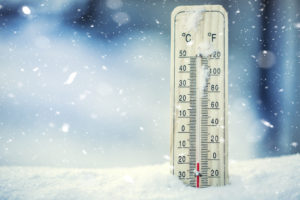
Small blood vessels constrict to limit blood flow to your extremities when temperatures drop. This process is known as vasoconstriction, and it’s your body’s natural way of working to maintain your core temperature.
Bad things happen when your core temperature goes too low. Hypothermia can set in, and organs stop functioning. Your body says it can sacrifice your hands and feet to make sure your heart, lungs, and brain stay functional.
It’s a fair trade.
Although cold weather doesn’t necessarily mean poor circulation (it’s just your body protecting itself), it doesn’t mean you should ignore the potential effects of the cold. Especially if you’ve got high blood pressure.
The best way to keep blood flowing throughout your body when you’re out in the cold is by dressing appropriately. Wearing layers, warm socks, gloves, a hat, and a scarf can all help optimize blood flow to the extremities.
Maintaining activity levels can help too. Getting out for walks or shoveling the driveway encourages blood flow and can ultimately improve circulation. If done regularly, they have long-lasting effects on lowering blood pressure.
Vasodilators—drugs and compounds that relax and dilate blood vessels—are useful for circulation if staying indoors or in warmer temperatures. If using them in the winter, however, pay attention as it can be dangerous.
It is imperative to layer up if you’ve been drinking alcohol or taking other drugs or products that relax veins. Without doing so, your core temperature has a greater chance of dropping as more blood feeds into your extremities.
Staying warm in the winter can help optimize circulation and blood medications you may be taking. Be cautious and always wear layers that can be removed or reapplied when needed.